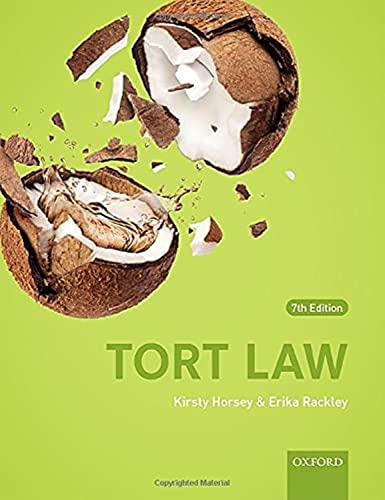Question
Distinguish between terms and mere representations that are made during contractual negotiations between parties? What is the distinction between the contractual terms 'condition' and 'warranty'?
- Distinguish between terms and mere representations that are made during contractual negotiations between parties?
- What is the distinction between the contractual terms 'condition' and 'warranty'?
- Discuss the meanining of the term 'parol evidence rule'?
- What must a party do in order to be able to rely on an exclusion clause?
- James agrees to survey land owned by Matthew. The negotiated contract consists of a statemen made by James that he will charge $1000 and an agreement by Matthew to pay this amount upon completion of the survey of her land. What are some terms that would be implied in the contract?
- What is a collateral contract? What must be satisfied before the courts will infer a collateral contract?
- Which of the following principles of law is not one, that is applied by the court in ascertaining
whether or not a person is bound by an exclusion clause?
a) In the absence of fraud, a person signing a written contract containing an exclusion clause will
be bound by the exclusion clause.
b) If the exclusion clause is contained in a document which the reasonable person would not have
regarded as one which would contain contractual terms it is not binding.
c) Knowledge of the exclusion clause may be inferred where the person has entered into that type
of contract many times before.
d) The person must have actually been made aware of the exclusion clause before the making of the contract.
8.What is the correct name for a term in an agreement which provides that the agreement does not
become a contract until the happening of a certain event?
a) A condition antecedent.
b) A condition subsequent.
c) A condition precedent.
d) A condition consequent.
9.Which of the following statements is the best description of a 'condition subsequent'?
a) A term in a contract, the consequences of breach of which cannot be determined until after
the breach has occurred and the seriousness of the effects of the breach can be ascertained.
b) A term in a contract which provides that the contract will terminate on the happening of a
particular event.
c) A term which must be satisfied before a contract can come into existence.
d) A term in a contract not essential to the main purpose of the contract, non-performance of
which will not entitle the plaintiff to rescind the contract.
10.Which of the following statements is the best description of a 'condition precedent'?
a) A term in a contract, the consequences of breach of which cannot be determined until after
the breach has occurred and the seriousness of the effects of the breach can be ascertained.
b) A term in a contract which provides that the contract will terminate on the happening of a
particular event.
c) A term in a contract, non-performance of which may result in rescission of the contract and/
or damages to the plaintiff.
d) A term which must be satisfied before a contract can come into existence.
Step by Step Solution
There are 3 Steps involved in it
Step: 1

Get Instant Access to Expert-Tailored Solutions
See step-by-step solutions with expert insights and AI powered tools for academic success
Step: 2

Step: 3

Ace Your Homework with AI
Get the answers you need in no time with our AI-driven, step-by-step assistance
Get Started


